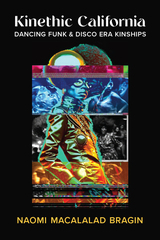26 start with S start with S

Science and technology have immense authority and influence in our society, yet their working remains little understood. The conventional perception of science in Western societies has been modified in recent years by the work of philosophers, sociologists and historians of science. In this book Bruno Latour brings together these different approaches to provide a lively and challenging analysis of science, demonstrating how social context and technical content are both essential to a proper understanding of scientific activity. Emphasizing that science can only be understood through its practice, the author examines science and technology in action: the role of scientific literature, the activities of laboratories, the institutional context of science in the modern world, and the means by which inventions and discoveries become accepted. From the study of scientific practice he develops an analysis of science as the building of networks. Throughout, Bruno Latour shows how a lively and realistic picture of science in action alters our conception of not only the natural sciences but also the social sciences and the sociology of knowledge in general.
This stimulating book, drawing on a wealth of examples from a wide range of scientific activities, will interest all philosophers, sociologists and historians of science, scientists and engineers, and students of the philosophy of social science and the sociology of knowledge.
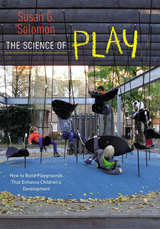
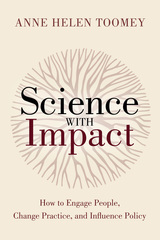
In this accessible volume, Toomey unpacks why “facts” mean different things to different people and how science-based attitudes and behaviors spread. Using humor, stories, and down-to-earth examples from her own science journey, she explains why seemingly straightforward evidence can sometimes feel irrelevant, or even threatening, to a skeptical public. This practical, how-to guide will help scientists think more carefully about the choices they make even before collecting data. It explores how researchers and others who work with science can address public distrust, communicate about uncertainty, and engage with policymakers for real-world impact.
Science with Impact argues that science can—and should—make a meaningful difference in society. It offers hope and guidance to those of us who wish to take the steps to make it so.
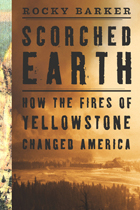
In 1988, forest fires raged in Yellowstone National Park, destroying more than a million acres. As the nation watched the land around Old Faithful burn, a longstanding conflict over fire management reached a fever pitch. Should the U.S. Park and Forest Services suppress fires immediately or allow some to run their natural course? When should firefighters be sent to battle the flames and at what cost?
In Scorched Earth, Barker, an environmental reporter who was on the ground and in the smoke during the 1988 fires, shows us that many of today's arguments over fire and the nature of public land began to take shape soon after the Civil War. As Barker explains, how the government responded to early fires in Yellowstone and to private investors in the region led ultimately to the protection of 600 million acres of public lands in the United States. Barker uses his considerable narrative talents to bring to life a fascinating, but often neglected, piece of American history. Scorched Earth lays a new foundation for examining current fire and environmental policies in America and the world.
Our story begins when the West was yet to be won, with a colorful cast of characters: a civil war general and his soldiers, America's first investment banker, railroad men, naturalists, and fire-fighters-all of whom left their mark on Yellowstone. As the truth behind the creation of America's first national park is revealed, we discover the remarkable role the U.S. Army played in protecting Yellowstone and shaping public lands in the West. And we see the developing efforts of conservation's great figures as they struggled to preserve our heritage. With vivid descriptions of the famous fires that have raged in Yellowstone, the heroes who have tried to protect it, and the strategies that evolved as a result, Barker draws us into the very heart of a debate over our attempts to control nature and people.
This entertaining and timely book challenges the traditional views both of those who arrogantly seek full control of nature and those who naively believe we can leave it unaltered. And it demonstrates how much of our broader environmental history was shaped in the lands of Yellowstone.
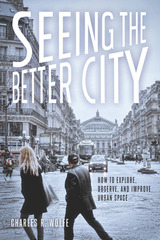
In order to understand and improve cities today, personal observation remains as important as ever. While big data, digital mapping, and simulated cityscapes are valuable tools for understanding urban space, using them without on-the-ground, human impressions risks creating places that do not reflect authentic local context. Seeing the Better City brings our attention back to the real world right in front of us, focusing it once more on the sights, sounds, and experiences of place in order to craft policies, plans, and regulations to shape better urban environments.
Through clear prose and vibrant photographs, Charles Wolfe shows those who experience cities how they might catalog the influences of urban form, neighborhood dynamics, public transportation, and myriad other basic city elements that impact their daily lives. He then shares insights into how they can use those observations to contribute to better planning and design decisions. Wolfe calls this the “urban diary” approach, and highlights how the perspective of the observer is key to understanding the dynamics of urban space. He concludes by offering contemporary examples and guidance on how to use carefully recorded and organized observations as a tool to create change in urban planning conversations and practice.
From city-dwellers to elected officials involved in local planning and design issues, this book is an invaluable tool for constructive, creative discourse about improving urban space.
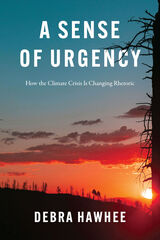
Why is it difficult to talk about climate change? Debra Hawhee argues that contemporary rhetoric relies on classical assumptions about humanity and history that cannot conceive of the present crisis. How do we talk about an unprecedented future or represent planetary interests without privileging our own species? A Sense of Urgency explores four emerging answers, their sheer novelty a record of both the devastation and possible futures of climate change. In developing the arts of magnitude, presence, witness, and feeling, A Sense of Urgency invites us to imagine new ways of thinking with our imperiled planet.
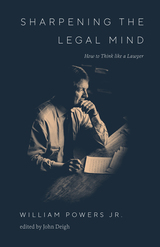
The way lawyers think about the law can seem deeply mysterious. They see nuance and meaning in statutes and implications in judicial opinions that are opaque to the rest of us. Accessible and thought provoking, Sharpening the Legal Mind explains how lawyers analyze the cases and controversies that come before the courts.
Written by William Powers Jr., the former president of the University of Texas at Austin, this book is an authoritative introduction to the academic study of law and legal reasoning, including insights into the philosophy of law and the intellectual history of legal thought. Powers discusses the methods lawyers use to interpret the law, the relation between law and morals, and the role of courts in shaping the law. In eight chapters, he follows the historical debate on these issues and others through different generations and movements in American legal thought—formalism, realism, positivism—to critical legal studies and postmodern theory. The perfect read for anyone looking for a primer on legal reasoning, Sharpening the Legal Mind demystifies the debates and approaches to thinking like a lawyer that profoundly influence the rule of law in our lives.
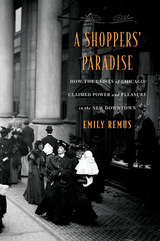
How women in turn-of-the-century Chicago used their consumer power to challenge male domination of public spaces and stake their own claim to downtown.
Popular culture assumes that women are born to shop and that cities welcome their trade. But for a long time America’s downtowns were hardly welcoming to women. Emily Remus turns to Chicago at the turn of the twentieth century to chronicle a largely unheralded revolution in women’s rights that took place not at the ballot box but in the streets and stores of the business district.
After the city’s Great Fire, Chicago’s downtown rose like a phoenix to become a center of urban capitalism. Moneyed women explored the newly built department stores, theaters, and restaurants that invited their patronage and encouraged them to indulge their fancies. Yet their presence and purchasing power were not universally appreciated. City officials, clergymen, and influential industrialists condemned these women’s conspicuous new habits as they took their place on crowded streets in a business district once dominated by men.
A Shoppers’ Paradise reveals crucial points of conflict as consuming women accessed the city center: the nature of urban commerce, the place of women, the morality of consumer pleasure. The social, economic, and legal clashes that ensued, and their outcome, reshaped the downtown environment for everyone and established women’s new rights to consumption, mobility, and freedom.
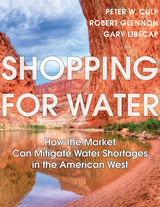
Shopping for Water begins by reviewing key dimensions of this problem: the challenges of population and economic growth, the environmental stresses from overuse of common water resources, the risk of increasing water-supply volatility, and the historical disjunction that has developed between and among rural and urban water users regarding the amount we consume and the price we pay for water. The authors then turn to five proposals to encourage the broader establishment and use of market institutions to encourage reallocation of water resources and to provide new tools for risk mitigation. Each of the five proposals offers a means of building resilience into our water management systems.
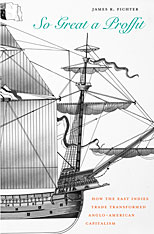
In a work of sweep and ambition, James Fichter explores how American trade proved pivotal to the evolution of capitalism in the United States and helped to shape the course of the British Empire.
Before the American Revolution, colonial merchants were part of a trading network that spanned the globe. After 1783, U.S. merchants began trading in the East Indies independently, creating a new class of investor-capitalists and the first generation of American millionaires. Such wealth was startling in a country where, a generation earlier, the most prosperous Americans had been Southern planters. This mercantile elite brought its experience and affluence to other sectors of the economy, helping to concentrate capital and create wealth, and paving the way for the modern business corporation.
Conducted on free trade principles, American trade in Asia was so extensive that it undermined the monopoly of the British East India Company and forced Britain to open its own free trade to Asia. The United States and the British Empire thus converged around shared, Anglo-American free-trade ideals and financial capitalism in Asia. American traders also provided a vital link to the Atlantic world for Dutch Java and French Mauritius, and were at the vanguard of Western contact with Polynesia and the Pacific Northwest.
Based on an impressive array of sources from Europe, Asia, Africa, and the United States, this pathbreaking book revolutionizes our understanding of the early American economy in a global context and the relationship between the young nation and its former colonial master.
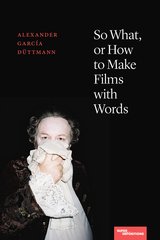
Images, whether filmic or not, cannot be replaced by words. Yet words can make images. This is the general thesis underlying So What, a collection of essays on canonical filmmakers like Luchino Visconti and Orson Welles; more experimental directors, such as Marguerite Duras and Albert Serra; and visual artists, including Hollis Frampton and Agnes Martin. Alexander García Düttmann aims to make their films as if they did not precede his text, capturing their idea and experience.
If the relationship between filmic image and text is a heterogeneous one, then this heterogeneity must leave a trace. This is why the book’s chapters are organized not according to historical periods or on the basis of film theories but rather by single concepts that function like dictionary entries. The chapters adopt different forms, blurring the lines between art and philosophy. So What is a practical exercise in “making films with words,” inviting readers to draw out insights from its conceptual play.
So What compiles previously untranslated and hard-to-find essays into a single volume, one that represents the absorbing and singular thought process of a major contemporary philosopher.
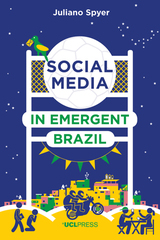

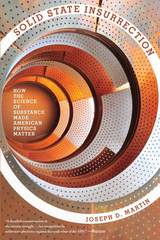
Solid State Insurrection argues that solid state physics was essential to securing the vast social, political, and financial capital Cold War physics enjoyed in the twentieth century. Solid state’s technological bent, and its challenge to the “pure science” ideal many physicists cherished, helped physics as a whole respond more readily to Cold War social, political, and economic pressures. Its research kept physics economically and technologically relevant, sustaining its cultural standing and policy influence long after the sheen of the Manhattan Project had faded. With this book, Joseph D. Martin brings a new perspective to some of the most enduring questions about the role of physics in American history.

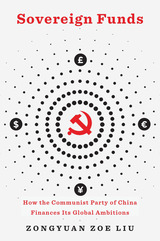
The first in-depth account of the sudden growth of China’s sovereign wealth funds and their transformative impact on global markets, domestic and multinational businesses, and international politics.
One of the keys to China’s global rise has been its strategy of deploying sovereign wealth on behalf of state power. Since President Xi Jinping took office in 2013, China has doubled down on financial statecraft, making shrewd investments with the sovereign funds it has built up by leveraging its foreign exchange reserves. Sovereign Funds tells the story of how the Communist Party of China (CPC) became a global financier of surpassing ambition.
Zongyuan Zoe Liu offers a comprehensive and up-to-date analysis of the evolution of China’s sovereign funds, including the China Investment Corporation, the State Administration of Foreign Exchange, and Central Huijin Investment. Liu shows how these institutions have become mechanisms not only for transforming low-reward foreign exchange reserves into investment capital but also for power projection. Sovereign funds are essential drivers of the national interest, shaping global markets, advancing the historic Belt and Road Initiative, and funneling state assets into strategic industries such as semiconductors, fintech, and artificial intelligence. In the era of President Xi, state-owned financial institutions have become gatekeepers of the Chinese economy. Political and personal relationships with prestigious sovereign funds have enabled Blackstone to flourish in China and have fueled the ascendance of private tech giants such as Alibaba, Ant Finance, and Didi.
As Liu makes clear, sovereign funds are not just for oil exporters. The CPC is a leader in both foreign exchange reserves investment and economic statecraft, using state capital to encourage domestic economic activity and create spheres of influence worldwide.
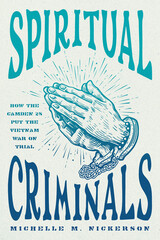
When the FBI arrested twenty-eight people in connection to a break-in at a Camden, New Jersey, draft board in 1971, the Bureau celebrated. The case should have been an easy victory for the department—the perpetrators had been caught red-handed attempting to destroy conscription documents for draftees into the Vietnam War. But the results of the trial surprised everyone, and in the process shook the foundations of American law, politics, and religion.
In Spiritual Criminals, Michelle M. Nickerson shares a complex portrait of the Camden 28, a passionate group of grassroots religious progressives who resisted both their church and their government as they crusaded against the Vietnam War. Founded by priests, nuns, and devout lay Catholics, members of this coalition accepted the risks of felony convictions as the cost of challenging the nation’s military-industrial complex and exposing the illegal counterintelligence operations of the FBI. By peeling away the layers of political history, theological traditions, and the Camden 28’s personal stories, Nickerson reveals an often-unseen spiritual side of the anti-war movement. At the same time, she probes the fractures within the group, detailing important conflicts over ideology, race, sex, and gender that resonate in the church and on the political Left today.
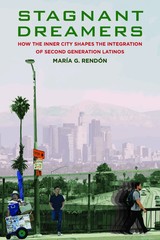
Winner of the 2020 Robert E. Park Award for Best Book from the Community and Urban Sociology Section of the American Sociological Association
Winner of the 2020 Distinguished Contribution to Research Award from the Latino/a Section of the American Sociological Association
Honorable Mention for the 2020 Thomas and Znaniecki Award from the International Migration Section of the American Sociological Association
A quarter of young adults in the U.S. today are the children of immigrants, and Latinos are the largest minority group. In Stagnant Dreamers, sociologist and social policy expert María Rendón follows 42 young men from two high-poverty Los Angeles neighborhoods as they transition into adulthood. Based on in-depth interviews and ethnographic observations with them and their immigrant parents, Stagnant Dreamers describes the challenges they face coming of age in the inner city and accessing higher education and good jobs, and demonstrates how family-based social ties and community institutions can serve as buffers against neighborhood violence, chronic poverty, incarceration, and other negative outcomes.
Neighborhoods in East and South Central Los Angeles were sites of acute gang violence that peaked in the 1990s, shattering any romantic notions of American life held by the immigrant parents. Yet, Rendón finds that their children are generally optimistic about their life chances and determined to make good on their parents’ sacrifices. Most are strongly oriented towards work. But despite high rates of employment, most earn modest wages and rely on kinship networks for labor market connections. Those who made social connections outside of their family and neighborhood contexts, more often found higher quality jobs. However, a middle-class lifestyle remains elusive for most, even for college graduates.
Rendón debunks fears of downward assimilation among second-generation Latinos, noting that most of her subjects were employed and many had gone on to college. She questions the ability of institutions of higher education to fully integrate low-income students of color. She shares the story of one Ivy League college graduate who finds himself working in the same low-wage jobs as his parents and peers who did not attend college. Ironically, students who leave their neighborhoods to pursue higher education are often the most exposed to racism, discrimination, and classism.
Rendón demonstrates the importance of social supports in helping second-generation immigrant youth succeed. To further the integration of second-generation Latinos, she suggests investing in community organizations, combating criminalization of Latino youth, and fully integrating them into higher education institutions. Stagnant Dreamers presents a realistic yet hopeful account of how the Latino second generation is attempting to realize its vision of the American dream.
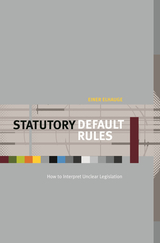
Most new law is statutory law; that is, law enacted by legislators. An important question, therefore, is how should this law be interpreted by courts and agencies, especially when the text of a statute is not entirely clear. There is a great deal of scholarly literature on the rules and legal materials courts should use in interpreting statutes. This book takes a fresh approach by focusing instead on what judges should do once the legal materials fail to resolve the interpretive question. It challenges the common assumption that in such cases judges should exercise interstitial lawmaking power. Instead, it argues that--wherever one believes the interpretive inquiry has failed to resolve the statutory meaning--judges can and should use statutory default rules that are designed to maximize the satisfaction of enactable political preferences; that is, the political preferences of the polity that are shared among enough elected officials that they could and would be enacted into law if the issue were on the legislative agenda.
These default rules explain many recent high-profile cases, including the Guantánamo detainees case, the sentencing guidelines case, the decision denying the FDA authority to regulate cigarettes, and the case that refused to allow the attorney general to criminalize drugs used in physician-assisted suicide.
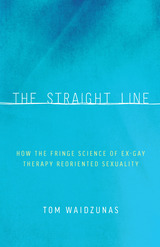
To be taken seriously, therapies that claim to “cure” homosexuality wrap themselves in lab coats. Even though the fit is bad, and such therapies and their theorists now inhabit the scientific fringe, the science of sexuality has made some adjustments, too, Tom Waidzunas tells us in this provocative work.
Intervening in the politics of sexuality and science, The Straight Line argues that scientific definitions of sexual orientation do not merely reflect the results of investigations into human nature, but rather emerge through a process of social negotiation between opposing groups. The demedicalization of homosexuality and the discrediting of reparative therapies, ex-gay ministries, and reorientation research have, Waidzunas contends, required scientists to enforce key boundaries around scientific expertise and research methods. Drawing on extensive participant observation at conferences for ex-gays, reorientation therapists, mainstream psychologists, and survivors of ex-gay therapy, as well as interviews with experts and activists, The Straight Line traces reorientation debates in the United States from the 1950s to the present, following homosexuality therapies from the mainstream to the margins. As the ex-gay movement has become increasingly transnational in recent years, Waidzunas turns to Uganda, where ideas about the scientific nature of homosexuality influenced the passage of the Anti-Homosexuality Act of 2014.
While most studies treat the ex-gay movement as a religious phenomenon, this book looks at how the movement, in its attempts to establish legitimacy, has engaged with scientific institutions, shaping virulent anti-gay public policy.
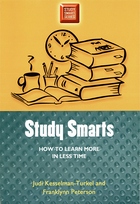
THE STUDY SMART SERIES, designed for students from junior high school through lifelong learning programs, teaches skills for research and note-taking, provides exercises to improve grammar, and reveals secrets for putting these skills together in great essays.
Some students are not getting the grades they want, and others spend too much time working for good grades. Any student can find useful advice in Study Smarts: How to Learn More in Less Time. Study Smarts is the most complete and lively guide to streamlined studying. In a highly readable style, the authors eliminate the confusion and anxiety often felt about keeping up with course work.
Each chapter explains a different technique, and each chapter title is a nugget of advice that summarizes that technique. For example, “Eliminate interference from your environment;” or “Never study anything the same way twice.”
The writers explain how to set goals, take notes, review, cut reading time, make the most of class discussions, etc., all as efficiently as possible. Beyond refining basic study chores, there are novel tips for time management and cramming and special memory techniques. The authors also tell how to get outside help for special problems.
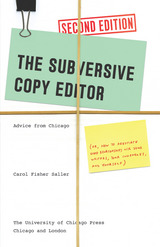
In this second edition, Saller adds new chapters, on the dangers of allegiance to outdated grammar and style rules and on ways to stay current in language and technology. She expands her advice for writers on formatting manuscripts for publication, on self-editing, and on how not to be “difficult.” Saller’s own gaffes provide firsthand (and sometimes humorous) examples of exactly what not to do. The revised content reflects today’s publishing practices while retaining the self-deprecating tone and sharp humor that helped make the first edition so popular. Saller maintains that through carefulness, transparency, and flexibility, editors can build trust and cooperation with writers.
The Subversive Copy Editor brings a refreshingly levelheaded approach to the classic battle between writers and editors. This sage advice will prove useful and entertaining to anyone charged with the sometimes perilous task of improving the writing of others.
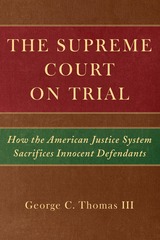
The chief mandate of the criminal justice system is not to prosecute the guilty but to safeguard the innocent from wrongful convictions; with this startling assertion, legal scholar George Thomas launches his critique of the U.S. system and its emphasis on procedure at the expense of true justice.
Thomas traces the history of jury trials, an important component of the U.S. justice system, since the American Founding. In the mid-twentieth century, when it became evident that racism and other forms of discrimination were corrupting the system, the Warren Court established procedure as the most important element of criminal justice. As a result, police, prosecutors, and judges have become more concerned about following rules than about ensuring that the defendant is indeed guilty as charged. Recent cases of prisoners convicted of crimes they didn't commit demonstrate that such procedural justice cannot substitute for substantive justice.
American justices, Thomas concludes, should take a lesson from the French, who have instituted, among other measures, the creation of an independent court to review claims of innocence based on new evidence. Similar reforms in the United States would better enable the criminal justice system to fulfill its moral and legal obligation to prevent wrongful convictions.
"Thomas draws on his extensive knowledge of the field to elaborate his elegant and important thesis---that the American system of justice has lost sight of what ought to be its central purpose---protection of the innocent."
—Susan Bandes, Distinguished Research Professor of Law, DePaul University College of Law
"Thomas explores how America's adversary system evolved into one obsessed with procedure for its own sake or in the cause of restraining government power, giving short shrift to getting only the right guy. His stunning, thought-provoking, and unexpected recommendations should be of interest to every citizen who cares about justice."
—Andrew E. Taslitz, Professor of Law, Howard University School of Law
"An unflinching, insightful, and powerful critique of American criminal justice---and its deficiencies. George Thomas demonstrates once again why he is one of the nation's leading criminal procedure scholars. His knowledge of criminal law history and comparative criminal law is most impressive."
—Yale Kamisar, Distinguished Professor of Law, University of San Diego and Clarence Darrow Distinguished University Professor Emeritus of Law, University of Michigan
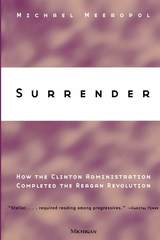
Meeropol provides compelling evidence of the failure of the U.S. economy between 1990 and 1994 to generate rising incomes for most of the population or improvements in productivity. This caused, first, the electoral repudiation of President Bush in 1992, followed by a repudiation of President Clinton in the 1994 Congressional elections. The Clinton administration made a half-hearted attempt to reverse the Reagan Revolution in economic policy, but ultimately surrendered to the Republican Congressional majority in 1996 when Clinton promised to balance the budget by 2000 and signed the welfare reform bill. The rapid growth of the economy in 1997 caused surprisingly high government revenues, a dramatic fall in the federal budget deficit, and a brief euphoria evident in an almost uncontrollable stock market boom. Finally, Meeropol argues powerfully that the next recession, certain to come before the end of 1999, will turn the predicted path to budget balance and millennial prosperity into a painful joke on the hubris of public policymakers.
Accessibly written as a work of recent history and public policy as much as economics, this book is intended for all Americans interested in issues of economic policy, especially the budget deficit and the Clinton versus Congress debates. No specialized training in economics is needed.
"A wonderfully accessible discussion of contemporary American economic policy. Meeropol demonstrates that the Reagan-era policies of tax cuts and shredded safety nets, coupled with strident talk of balanced budgets, have been continued and even brought to fruition by the neo-liberal Clinton regime." --Frances Fox Piven, Graduate School, City University of New York
Michael Meeropol is Chair and Professor of Economics, Western New England College.

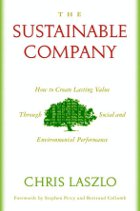
The Sustainable Company shows how to create value for shareholders while balancing responsibilities to society and the environment. Its step-by-step approach and tool-kit for managers make this book the solutions manual for the twenty-first-century manager.
READERS
Browse our collection.
PUBLISHERS
See BiblioVault's publisher services.
STUDENT SERVICES
Files for college accessibility offices.
UChicago Accessibility Resources
home | accessibility | search | about | contact us
BiblioVault ® 2001 - 2024
The University of Chicago Press




